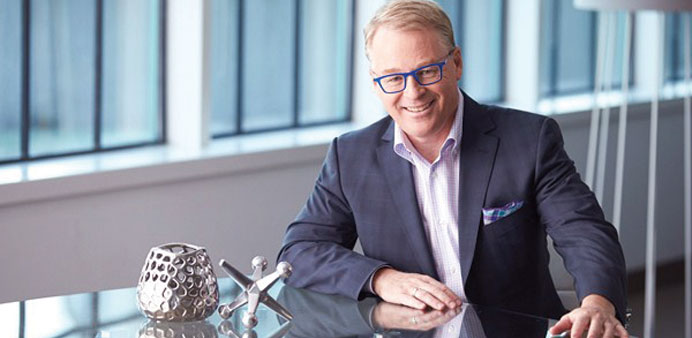Keith Pelley (pictured), the new chief executive, has a tall order to spice up a sport which if the recent Dunhill Links Championship is anything to go by, is desperately in need of a makeover
By Ewan Murray
The Guardian
Thorbjorn Olesen will remember the Dunhill Links Championship fondly forever. And so he should; the young Dane had suffered all manner of form and fitness woes before returning to the winner’s circle at the Old Course last Sunday. A year ago, Oliver Wilson’s triumph marked one of the most endearing golf tales in many a season.
Fine winners, and a hefty prize purse, do not equate to an appealing tournament. In fact, the sad reality of the Dunhill is it has regressed into the realms of the unwatchable; a matter highlighted by the sparse galleries at St Andrews on Sunday afternoon. On television, up against a Merseyside derby plus Arsenal against Manchester United, the numbers cannot have been pretty.
This event now offers a tired, dull concept akin to a rich man’s tea party. The initial idea of mixing celebrities with professionals on brilliant golf courses was a novel one. In 2015, everyone with even half an interest has already seen these amateurs slashing around. Whether in person or on television, the soul-destroying time to complete Dunhill rounds on the simple basis of format is akin to watching paint dry. It doesn’t work, it isn’t entertaining.
There is no spectacle, no flow to the competition, no discernible narrative. You could tune in or turn up at 5pm each day having missed absolutely nothing of consequence.
So long as Ronan Keating, Tony McCoy and their fellow millionaires enjoy themselves, claiming some tabloid photo space in the meantime, are we supposed to laugh along and hail a fantastic tournament? Even the spectacular settings of Carnoustie, St Andrews and Kingsbarns are lost in the never-ending mess. They would never say as much in public, but even players will have reservations.
In many ways, four days in Scotland summed up golf’s predicament. It highlighted the work which needs to be undertaken by the European Tour’s new chief executive, Keith Pelley . Whereas cricket and Formula One - essentially boring sports when stripped back to basics - have grasped every opportunity to move with the times and engage fresh audiences with all manner of innovation, golf has stood still with an inherent belief that what it offers should automatically be acclaimed by the masses.
Not only does that arrogance fail with regards to viewers, it is hardly attractive to sponsors amid what is an increasingly intense battle for their cash. Being blunt, golf lacks the superstar attraction afforded to many cricketers, racing drivers and even certain rugby players; in itself it is a disservice to a batch of fantastic and interesting performers.
For now, golf takes exactly the same thing to every corner of the globe and simply expects it to succeed. When something different is provided, such as the Dunhill, it is at the opposite end of the scale from what is actually required.
Giles Morgan, the head of HSBC’s sponsorship division and therefore one of the key players golf must keep onside, has accurately stressed as much. “There are lots of positives about golf but the world, particularly with digital communications and people’s time, has changed in the last 15 years beyond anybody’s wildest dreams,” he said earlier this year.
“I’m not sure that golf has kept up with that change. I think, because it attracts high investment, has famous superstars, its men and women, its old and young and it’s relatively healthy, there are lots of good reasons it can look at all of the ingredients and then re-bake the cake.”
Pelley’s appointment in itself was intriguing. His early steps were popular, in refusing to concede the timing of next year’s French Open in a clash with the WGC-Bridgestone Invitational and averting any row with Rory McIlroy over the Northern Irishman’s role in the Race to Dubai. To a large extent, though, this is window dressing. There is a bigger picture as to how golf captures hearts and minds.
The excitable Pelley’s passions are twofold; sport and the media. This suggests, and we can but hope, a realisation within the Tour that the way golf is presented and consumed must quickly change. The PGA Tour recognised this some time ago; several events in the United States aren’t nearly as significant as a cleverly-executed media policy suggest. Digital strategy, for example, is first class.
Golf needs to launch a T20 equivalent. Why should tournaments always conclude on a Sunday, the most congested afternoon on sport’s television schedule? It must present even lengthy events in a format that constantly engages. There must be prominence outside of major championships and Ryder Cups, which means innovation and sense of occasion.
Last year, there was the very real prospect of players and caddies wearing microphones at one tournament, which provided a nod to the acknowledgement that the current set-up is stale. This week’s close tie-up between Sky Sports and the returning British Masters is probably no coincidence. Through it, the Tour and a media partner can work to mutual benefit.
Through such joined-up thinking, golf can finally evolve; beyond the position where half-day rounds in the company of A or Z listers seeking to remain relevant is regarded as the best it can offer.

